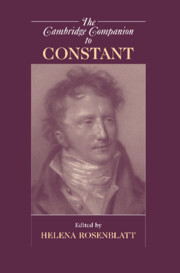Book contents
- Frontmatter
- Introduction
- 1 Benjamin Constant: Life and Work
- Part I The Political Thinker and Actor
- Part II The Psychologist and Critic
- Part III The Analyst and Historian of Religion
- 12 Religion According to Constant
- 13 Constant on the Religious Spirit of Liberalism
- 14 Constant and Religion: “Theism Descends from Heaven to Earth”
- Conclusion
- 15 Eclipses and Revivals Constant’s: Reception in France and America 1830-2007
- Bibliography
- Index
- Series List
13 - Constant on the Religious Spirit of Liberalism
from Part III - The Analyst and Historian of Religion
Published online by Cambridge University Press: 28 July 2009
- Frontmatter
- Introduction
- 1 Benjamin Constant: Life and Work
- Part I The Political Thinker and Actor
- Part II The Psychologist and Critic
- Part III The Analyst and Historian of Religion
- 12 Religion According to Constant
- 13 Constant on the Religious Spirit of Liberalism
- 14 Constant and Religion: “Theism Descends from Heaven to Earth”
- Conclusion
- 15 Eclipses and Revivals Constant’s: Reception in France and America 1830-2007
- Bibliography
- Index
- Series List
Summary
Benjamin Constant’s writings have not generally been considered an interesting resource for political theorists concerned with the relation between religion and liberalism. Today Constant is best known for his 1819 lecture comparing ancient and modern liberty. In that lecture, he defended the freedom of the moderns against the nostalgic rhetoric of republicanism that he thought had been used to justify dangerous political programs during and after the Revolution. Against those writers who suggested that freedom required Spartan self-sacrifice and public spiritedness, Constant argued that commercial society attaches us to a distinctively modern sort of liberty, a freedom concerned not primarily with involvement in politics but instead with the protection of private “enjoyments” and the opportunities for personal self-development. The memories of Robespierre, of Napoleon, and of other efforts to hijack the language of ancient republicanism had left Constant deeply opposed to any government program that sought to impose on citizens a particular understanding of moral or political virtue.
With this familiar view of Constant in mind, it would be natural to assume that his position on religion would simply aim to ensure that the state did not impose any form of worship on its citizens. And since liberal theorists today already agree that the state should be neutral with regard to religions and religious sects, it might seem that Constant’s thought does not offer them anything that they do not already know.
- Type
- Chapter
- Information
- The Cambridge Companion to Constant , pp. 286 - 312Publisher: Cambridge University PressPrint publication year: 2009
- 5
- Cited by

